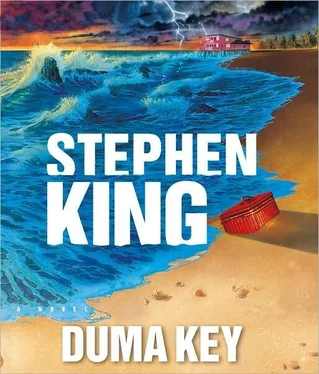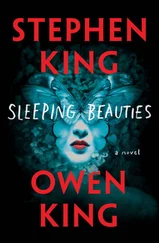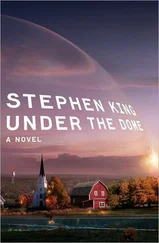But Elizabeth had known what it was like.
It was in her drawings, then in her paintings.
It was like being given a tongue when you had been mute. And more. Better. It was like being given back your memory, and a person’s memory is everything, really. Memory is identity. It’s you . Even from that first line — that incredibly brave first line meant to show where the Gulf met the sky — she had understood that seeing and memory were interchangeable, and had set out to mend herself.
Perse hadn’t been in it. Not at first.
I was sure of that.
For the next four hours, I slipped in and out of Libbit’s world. It was a wonderful, frightening place to be. Sometimes I scribbled words — The gift is always hungry, start with what you know — but mostly it was pictures. Pictures were the real language we shared.
I understood her family’s quick arc from amazement to acceptance to boredom. It had happened partly because the girl was so prolific, maybe more because she was part of them, she was their little Libbit, and there’s always that feeling that no good can come out of Nazareth, isn’t there? But their boredom only made her hunger stronger. She looked for new ways to wow them, sought new ways of seeing.
And found them, God help her.
I drew birds flying upside-down, and animals walking on the swimming pool.
I drew a horse with a smile so big it ran off the sides of its face. I thought it was right around then that Perse had entered the picture. Only —
“Only Libbit didn’t know it was Perse,” I said. “She thought—”
I thumbed back through her drawings, almost to the beginning. To the round black face with the smiling mouth. At first glance I had dismissed this one as Elizabeth’s portrait of Nan Melda, but I should have known better — it was a child’s face, not a woman’s. A doll’s face. Suddenly my hand was printing NOVEEN beside it in strokes so hard that Elizabeth’s old canary-yellow pencil snapped on the last stroke of the second N. I threw it on the floor and grabbed another.
It was Noveen that Perse had spoken through first, so as not to frighten her little genius. What could be less threatening than a little black girl-dolly who smiled and wore a red kerchief around her head, just like the beloved Nan Melda?
And was Elizabeth shocked or frightened when the doll began to speak on its own? I didn’t think so. She might have been fiercely talented in that one narrow way, but she was still only a child of three.
Noveen told her things to draw, and Elizabeth —
I grabbed my sketch-pad again. Drew a cake lying on the floor. Splattered on the floor. Little Libbit thought that prank was Noveen’s idea, but it had been Perse, testing Elizabeth’s power. Perse experimenting as I had experimented, trying to find out how powerful this new tool might be.
Next had come the Alice.
Because, her doll whispered, there was treasure and a storm would uncover it.
So not an Alice at all, not really. And not an Elizabeth, because she hadn’t been Elizabeth yet — not to her family, not to herself. The big blow of ’27 had been Hurricane Libbit.
Because Daddy would like finding a treasure. And because Daddy needed to think of something besides —
“She’s made her bed,” I said in a harsh voice that didn’t sound like my own. “Let her sleep in it.”
— besides how mad he was at Adie for running off with Emery, that Celluloid Collar.
Yes. That was how it had been on the south end of Duma Key, back in ’27.
I drew John Eastlake — only it was just his fins showing against the sky, and the tip of his snorkel, and a shadow beneath. John Eastlake diving for treasure.
Diving for his youngest daughter’s new doll, although he probably didn’t believe it.
Beside one flipper I printed the words FAIR SALVAGE.
The images rose in my mind, clearer and clearer, as if they had been waiting all these years to be liberated, and I wondered briefly if every painting (and every implement used to make them), from those on the walls of caves in central Asia to the Mona Lisa, held such hidden memories of their making and makers, encoded in their strokes like DNA.
Swim n kick til I say stop.
I added Elizabeth to the picture of Diving Daddy, standing up to her chubby knees in the water, Noveen tucked under her arm. Libbit almost could have been the doll-girl in the sketch Ilse had demanded — the one I had titled The End of the Game .
And after he saw all those things, he hug me hug me hug me.
I made a hurried little sketch of John Eastlake doing just that, his facemask pushed up on top of his head. The picnic basket was nearby, on a blanket, and the speargun was resting on top of it.
He hug me hug me hug me.
Draw her, a voice whispered. Draw Elizabeth’s fair salvage. Draw Perse.
But I wouldn’t. I was afraid of what I might see. And what it might do to me.
And what about Daddy? What about John? How much had he known?
I flipped through her drawings to the picture of John Eastlake screaming, with blood running from his nose and one eye. He had known plenty. Probably too late, but he had known.
What exactly had happened to Tessie and Lo-Lo?
And to Perse, to shut her up for all those years?
What exactly was she? Not a doll, that much seemed sure.
I could have gone on — a picture of Tessie and Lo-Lo running down a path, some path, hand-in-hand, was already asking to be drawn — but I was beginning to come out of my half-trance and was scared almost to death. Besides, I thought I knew enough to be going on with; Wireman could help me figure out the rest, I was almost sure of it. I closed my sketch-pad. I put down that long-gone little girl’s brown pencil — now just a nubbin — and realized I was hungry. Ravenous, in fact. But that kind of hangover wasn’t new to me, and there was plenty to eat in the refrigerator.
I went downstairs slowly, my head spinning with images — an upside-down heron with blue gimlet eyes, the smiling horses, the boat-size swim-fins on Daddy’s feet — and I didn’t bother with the living room lights. There was no need to; by April I could have navigated the route from the foot of the stairs to the kitchen in pitch blackness. By then I had made that solitary house with its chin jutting over the edge of the water my own, and in spite of everything, I couldn’t imagine leaving it. Halfway across the room I stopped, looking out through the Florida room to the Gulf.
There, riding at anchor no more than a hundred yards from the beach, clear and unmistakable in the light of a quarter-moon and a million stars, was the Perse . Her sails had been furled, but nets of rope sagged from her ancient masts like spiderwebs. The shrouds, I thought. Those are its shrouds . She bobbed up and down like a long dead child’s rotten toy. The decks were empty, so far as I could see — of both life and souvenirs — but who knew what might be belowdecks?
I was going to faint. At the same instant I realized this, I realized why: I had stopped breathing. I told myself to inhale, but for one terrible second, nothing happened. My chest remained as flat as a page in a closed book. When it rose at last, I heard a whooping sound. That was me, struggling to go on with life in a conscious state. I blew out the air I had just taken in and inhaled more, a little less noisily. Black specks flocked in front of my eyes in the dimness, then faded. I expected the ship out there to do the same — surely it had to be a hallucination — but it remained, perhaps a hundred and twenty feet long and a little less than half that in the beam. Bobbing on the waves. Rocking from side to side just a little, too. Bowsprit wagging like a finger, seeming to say Ouuu, you nasty man, you’re in for it n —
Читать дальше










